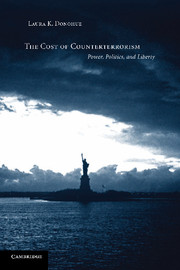3 - Financial Counterterrorism
Published online by Cambridge University Press: 29 June 2009
Summary
“[A] foreign entity without property or presence in this country has no constitutional rights, under the due process clause or otherwise.”
People's Mojahedin Organization of Iran v. U.S. Department of State, 1999“It is during our most challenging and uncertain moments that our nation's commitment to due process is most severely tested; and it is in those times that we must preserve our commitment at home to the principles for which we fight abroad.”
Justice Sandra Day O'Connor, Hamdi v. Rumsfeld, 2004“President George W. Bush's order freezing terrorist assets is directed as much against international banks and governments as Osama bin Laden's network.”
Richard Wolffe, Financial Times (London), 2001The United Kingdom and the United States have at least four goals in going after terrorist finance: to deprive terrorists of resources, to track operatives, to chart relationships, and to deter individuals from supporting terrorist organizations. Although these aims are critical to the success of a state's counterterrorist strategy, both countries have tried to fulfill them – as they have other counterterrorist objectives – in ways that not only erode the civil rights of their citizens, weakening the standards meant to protect them, but involve significant political, international, and humanitarian costs as well.
In the United Kingdom, the powers to interrupt the flow of funds to paramilitary organizations held by the Northern Ireland executive, and later by the British government, had for decades gone largely unused.
- Type
- Chapter
- Information
- The Cost of CounterterrorismPower, Politics, and Liberty, pp. 122 - 181Publisher: Cambridge University PressPrint publication year: 2008



